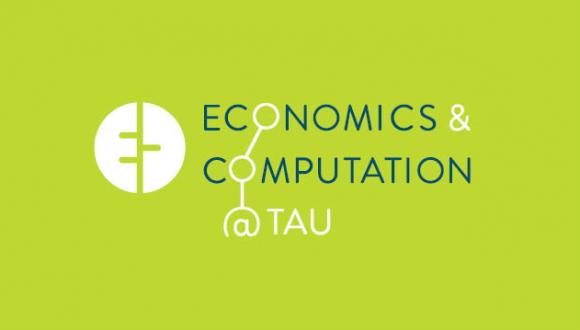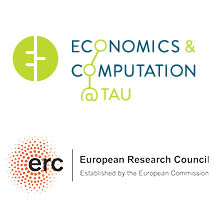The EC Lab@Tau Project
Who Are We?
The Economics and Computation (EC) Laboratory Project is supported by the European Research Council (ERC) under the European Union's Seventh Framework Programme (FP7/2007-2013).
While most of the focus of Algorithmic Mechanism Design (AMD) in its first decade was directed toward the design of truthful mechanisms, the aim of this project is to conduct a broad AMD theoretical study that goes beyond truthfulness and focuses instead on the natural themes of simplicity and fairness.
One of the primary goals of this project is the design of simple and fair (polynomial-time computable) mechanisms that perform at near-optimal levels with respect to important economic objectives such as social welfare and revenue. To this end, we work toward pinning down precise and informative models of simplicity and of fairness and quantify the effects of the restrictions arising from these models on the economic performance levels obtained by mechanisms adhering to them. The results of this project can be used to guide the design of natural mechanisms for important markets.
The first decade of Algorithmic Mechanism Design (AMD) studied, with great success, the design of truthful mechanisms for the allocation of resources among agents with private preferences. Truthful mechanisms are ones that incentivize rational users to report their preferences truthfully.
The Simplicity of mechanisms
For all their theoretical appeal, truthful mechanisms suffer from several inherent limitations, that lead inevitably to large communication and computation complexity overhead in their implementation. Therefore it is not surprising that practical applications forego truthfulness and use simpler mechanisms instead.
Simplicity is especially important in game-theoretic settings that are sensitive to the precise agent behavioral assumptions, and if these assumptions are invalid in practice - as may be the case when simplicity is not taken into account - then the resulting theory can lose some of its predictive validity for real-world settings. Simplicity of mechanisms in itself is insufficient however, because any meaningful mechanism should also have some notion of fairness, otherwise over time agents will stop using it.
In this project we conduct a broad AMD theoretical study that goes beyond truthfulness and focuses in addition on the natural themes of simplicity and fairness. We design and analyze simple, fair, and computationally tractable mechanisms that perform at near-optimal levels with respect to important economic objectives such as social welfare and revenue.










